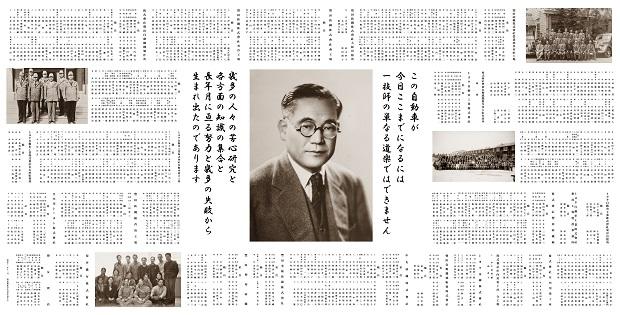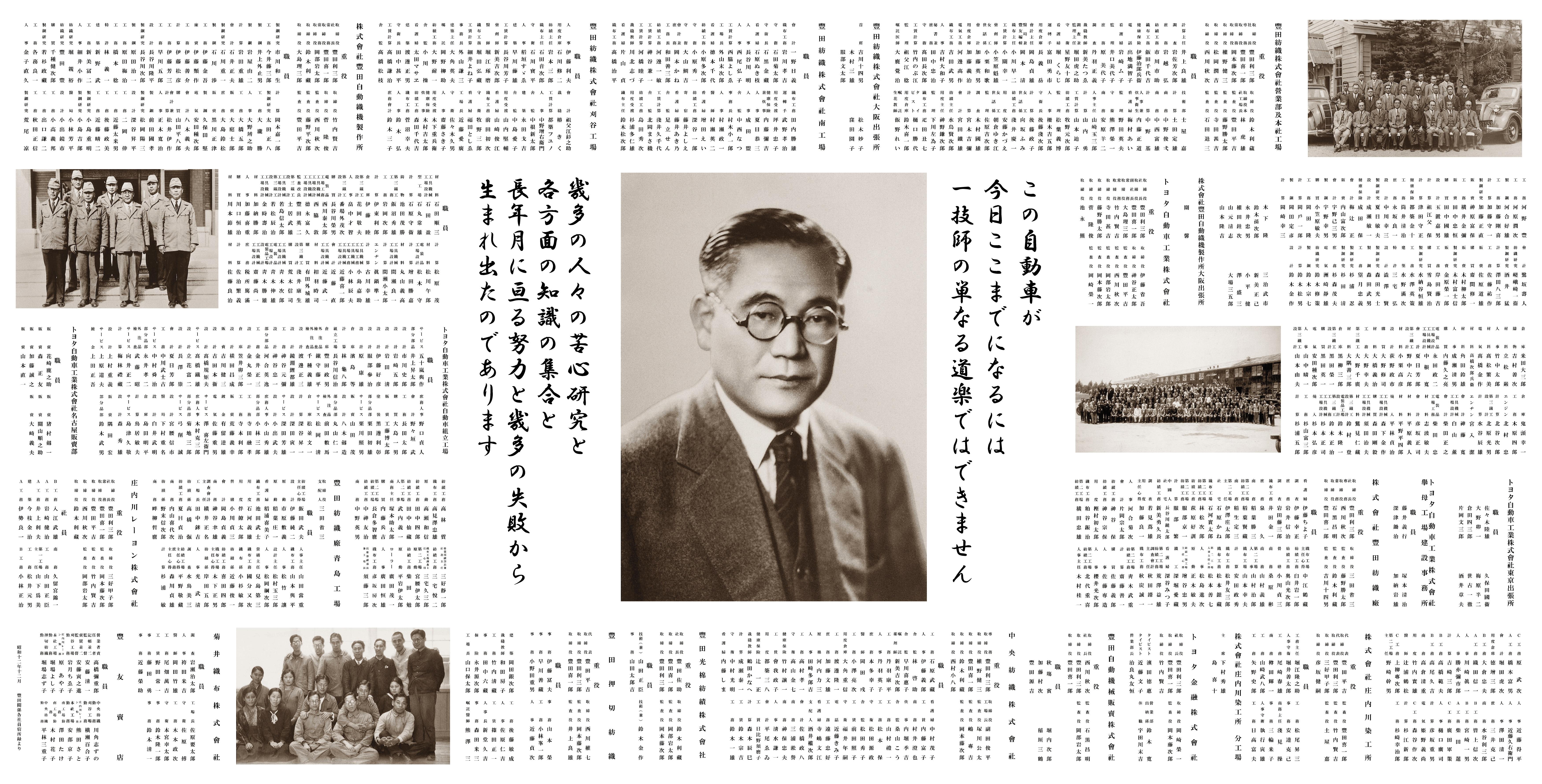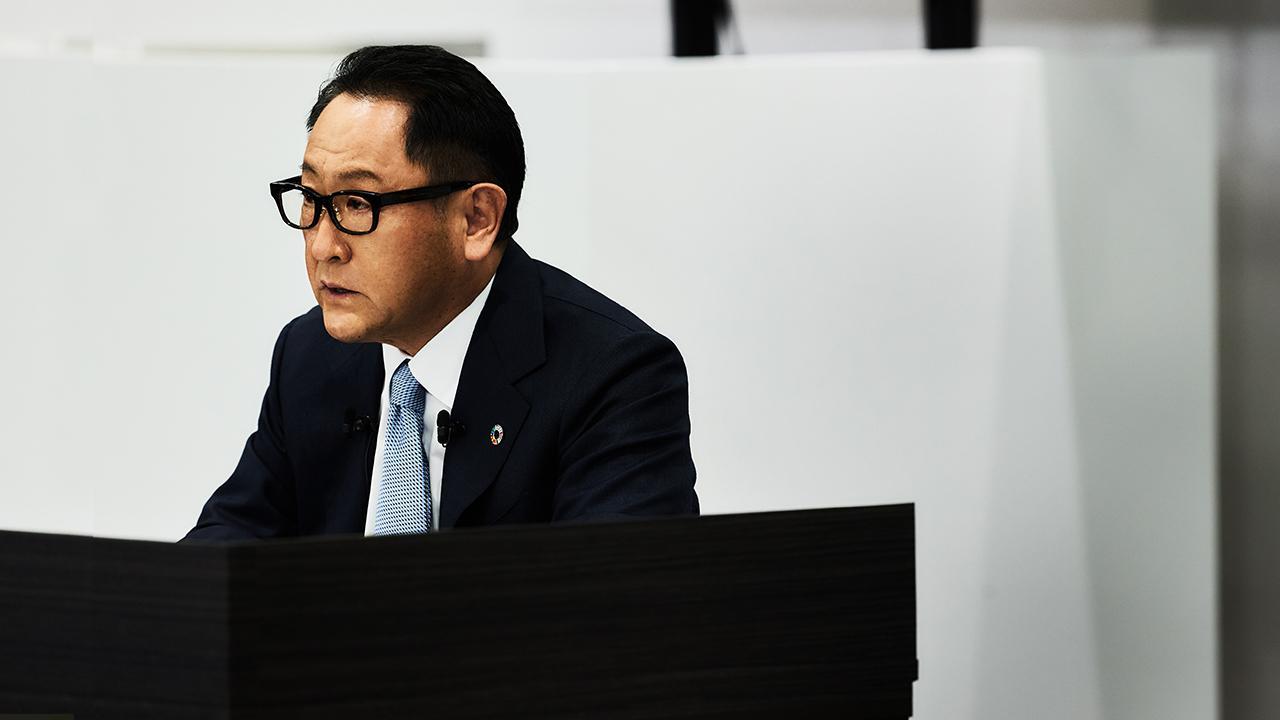
This is a three-part series on Akio's responses during the Q&A session at Toyota's 1H Financial Results briefing. In this article, the topic centers on "Toyota Philosophy" based on what Akio announced officially for the first time at the briefing.

As mentioned in previous articles on Toyota Times, President Akio Toyoda attended the second quarter/first half fiscal year 2021 results briefing, providing remarks.
His remarks were broadly separated into two sections. The first half was his take on the performance and results of the company in the first half, where he claimed that it was “not a natural outcome”. The second half of his remarks shifted to present Toyota’s activities based on the so-called Toyota Philosophy, which outlines Toyota’s core values.
In the subsequent Q&A session following his remarks, there were several questions about the “Toyota Philosophy”. This “Toyota Philosophy” was presented using a conical shape; actually, the original cone was actually put together more than 60 years ago by the top management at that time, after the passing of Kiichiro, the founder of Toyota, as they carried the baton passed down to them.

The automobile industry is in a once-in-a-century period of profound transformation. The Toyota Philosophy is an updated version of the cone, created for the 370,000 employees and their families working for us across the globe, as well as the members of the next generation who will support Toyota in the future.
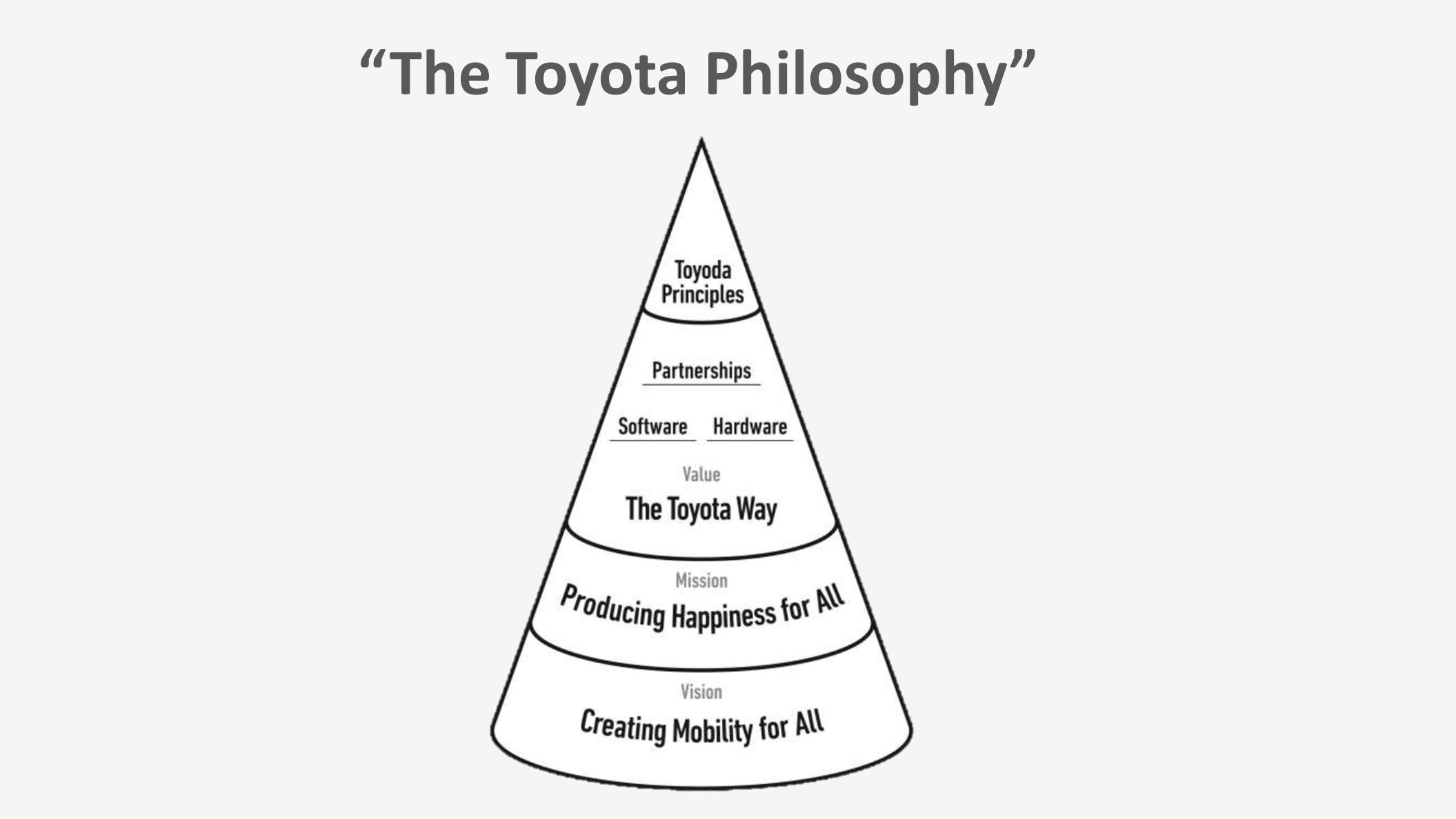
Toyota’s mission, as defined by the Toyota Philosophy, is “Producing Happiness for All”, and the vision is “Creating Mobility for All”.
Why is Toyota renewing its philosophy now? What thoughts were behind this new philosophy? What has driven Akio to do this? Akio’s responses provide a deep dive inside the intentions behind this mission of “Producing Happiness for All”.
What is important is to discuss what makes Toyota, Toyota
Why is Toyota renewing its philosophy now, and establishing a mission of "Producing Happiness for All"?
Akio
When I speak with various employees, I often use the word “fight”. At the same time, I say that I shouldn’t be discussing that in a confrontational context. Employees have asked “who are you fighting against?” Even I have wondered who I am fighting against.
I have come to think that it was “a fight to regain what it is that makes Toyota, Toyota.” When I think about what that might be, I was staying at a training center for the Toyota Group during the COVID-19 crisis [state of emergency], and an employee actually found and showed me that cone [graphic] that I just showed you.
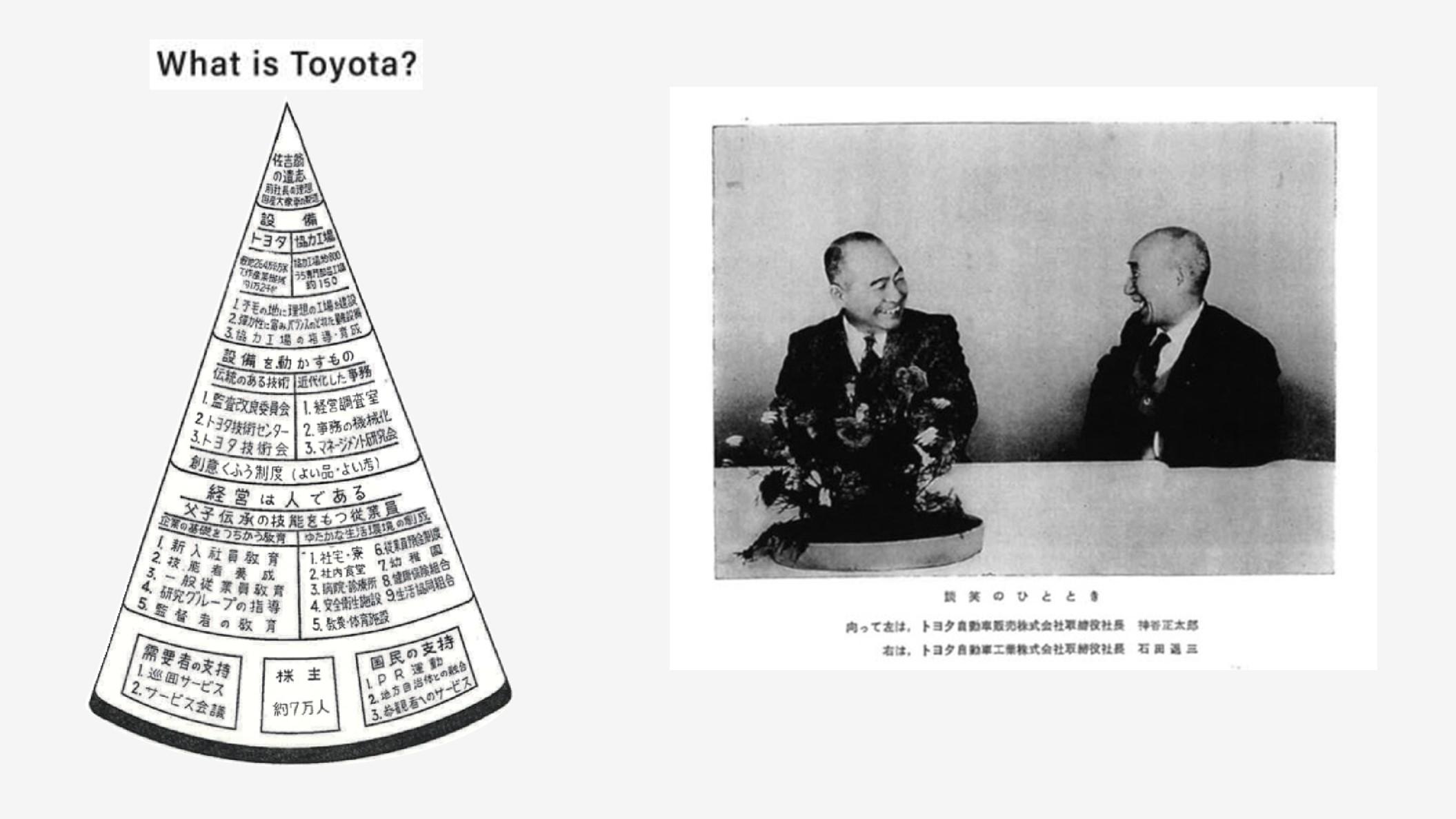
Based upon that cone, we established this Toyota philosophy I just showed you, adding new goals, a new mission, and a new vision.
As a matter of fact, just a moment ago one of the members of the corporate auditing board posed a question:
“It seems like Toyota doesn’t change, only thinking it should make those things that are necessary. Do you not know that it wasn’t the Neanderthals, but the Homo sapiens that survived?”
According to that auditor, “While the Neanderthals did make what was needed, Homo sapiens added beauty and enjoyment. Having what is needed and expressing that vision alone does not ensure survival.
Going back to the topic of the Toyota Production System, I have been saying that “Toyota is not seeking only efficiency. It is about making the work easier.” So we have taken the advice from that corporate auditor and (felt like) now we should not just make things “easier” but also “enjoyable”.
“Easy” and “Enjoyable” actually both share the same kanji (Chinese character) roots, but there are also feelings of liking something, being joyful, and something being fun, and I think people are supporting us and that is helping us to be able to survive.
By creating this philosophy, we will be able to gather various advice. What is important is that we use that cone graphic as a base to continue discussing what it is that makes Toyota, Toyota. Additionally, I believe we should use this as a tool to reflect on ourselves as we face changes in the environment.
In that sense, our SDGs are also used to make comparisons of what makes Toyota, Toyota, receiving an evaluation from around the world, as we aim to become a company that is chosen by other partners, working together as one moving forward. As such, I hope that we can ask for your continued support.
Is it possible to continue “Producing Happiness for All”?
As for the Toyota Philosophy, will Toyota be able to continue on this mission? There have indeed been companies in the past founded on very good core values that ultimately gave way to profit, and seeking their own interests. Therefore, the question is, in order to maintain the status quo, can things continue the way they are now? Or do some changes need to be made?
Akio
The philosophy is not the goal. I think of it rather as a starting point. Moving forward, as the situation around us changes, it is my hope that the people at the top will use it as a compass when confronted with problems.
I do not think it is wrong or a bad thing to pursue profit. Being a company means to make a profit and reliably pay tax. That is very important, and may be the best way to contribute to society in our view. So company seeking profit is not wrong. The question is how the company will use the profit it generates, and who it will be used for. I think the important thing is to make people who understand those two things.
At any rate, while there are sometimes criticisms about making a profit, a company that doesn’t generate income is, of course, unable to invest in the future. When I was first appointed as president, Toyota was booking deficits. At that time, we had to put the brakes on everything we were doing.
Now, we have been able to secure investment for the future and for our employees, and we can shift to work that is more enjoyable. But if we don’t generate profit, then we won’t be able to do that, and all we end up doing is pressing the brakes. Therefore, I ask all of our stakeholder to please not press the brakes on Toyota generating a profit.
Instead, I ask you to question, including your criticisms, how we are using the profit, what we are using it on, and what our intentions are.
As we listen carefully to that criticism and advice, we hope that we’ll make decisions daily hereafter that, as you take a long-term view, later you can look back on them and say “the decision reached at that time was the right one” or “the move you made at that time, everyone was opposed to it, but now, looking back, we can see that it was a turning point.”
What motivates Akio’s passion
At the briefing, attendees were mostly media-related; however, large shareholders were also represented. After several questions from reporters were answered, a question was asked by President Hiroshi Shimizu from Nippon Life Insurance Company. He started his question, saying, “As an institutional investor who has held Toyota shares for a very long time I would like to ask you a question.”
President Hiroshi Shimizu, Nippon Life Insurance Company
First, please allow me to express my gratitude to the management ranks, starting with President Toyoda, and each employee for their hard work in achieving these results.
I have been paying close attention to the words and phrases that have been used past to present by President Toyoda. Several of them have left a strong impression on me, such as “an intentional pause,” “making things is making people,” and “let me be the last to person to dwell on the past.” Today, I heard about the strong belief and philosophy. It was simple yet forceful, and I feel it shows the determination of President Toyoda.
President Toyoda always seems to be thinking about how he can take a larger responsibility, at a country or even global level.
With the goal to maintain a (Japan) domestic production level of 3 million units annually, he is expressing the determination to protect Japan’s monozukuri, employment, technology, and human resources. As for the full model change into a mobility company, as represented by Woven City, I feel like Toyota is truly aiming to achieve a future mobility society that no one has yet envisioned, centered around Toyota.
Additionally, it is clear that to achieve that kind of society, Toyota must make consortiums from alliances with other companies.
I would like to ask you to please tell us what motivates your passion, President Toyoda, as one not being constrained by Toyota, but placing Toyota as the center of creating future society, who moves about at the leading edge of “Producing happiness for all.”
Akio replied, first awkwardly commenting, “Thank you for your question. I feel a bit embarrassed by receiving such a positive and favorable assessment.”, then he continued on with his response.
Akio
Probably I could say that one is frustration or bitterness. Since I became president, I have constantly heard things like “You can never pull it off,” “You have never experienced any hardships,” and “You don’t know what is happening at the genba.” Some say “Let’s see what you’ve got” while they wait for me to fail and say “See, I told you so. You failed.” Regardless of being in those conditions we have come this far somehow, and I think it is because of the experience I’ve had with so many crises.
To me, the word “crisis” [in Japanese read “ki-ki”], there are two characters used to write it. One means “critical situation” and the other means “opportunity.” Said differently, the word gives both the meaning of “in a pinch” as well as “there is a chance.” As we focus on changing the “pinches” into “chances,” then comes the feedback, changing “You can never pull it off” to “You succeeded!”. I never want to be bested, and that drove me to work harder and harder.
One more thing is that I want to validate the founding members’ efforts. The 80-year history of the company controls the current role, and it has been supporting the management ranks including myself. (However,) the founding members never experienced the benefits of what they accomplished.
As soon as I said “We will transform from an automobile company to a mobility company,” I also took the challenging first step that I think will only parallel the hardships the founding members went through when transitioning “from a loom making company to an automobile company.”
Those of us currently in management are reaping the blessings of their work now, but for the future generations, will we be able to provide them the same favors? Toyota is not the main point, but rather Toyota, to survive, needs to be a company that is chosen by people who want to make the same kind of future that Toyota envisions. I believe that it is that type of thinking that becomes the source of my motivation.
And, if I may venture, I can also refer to my love of country. Toyota is a global company, and we aim to be the “best-in-town” company wherever we go, endeavoring to be chosen by the countries where we are allowed to operate. The fact that we’ve been able to do that is a credit to what our founding members did in establishing the automotive industry in Japan, and we want to contribute with our work to that automotive industry. I think that desire to contribute as Toyota has been a very important driving force behind me.
At the initial stages [of my presidency] it is true that I felt like I was alone. I was the pied piper but no one was behind me. Now, while I can’t say everyone is behind me, the number of people willing to dance to my song with me has increased. I hope to continue to do my best and select the next top management to hand the baton to that will continue to run into the future, so I hope you’ll continue to offer your support.
In the next installment in this three-part series, we will look at Akio’s response to a question where an analogy of a restaurant, chef and kitchen is shared and why.


